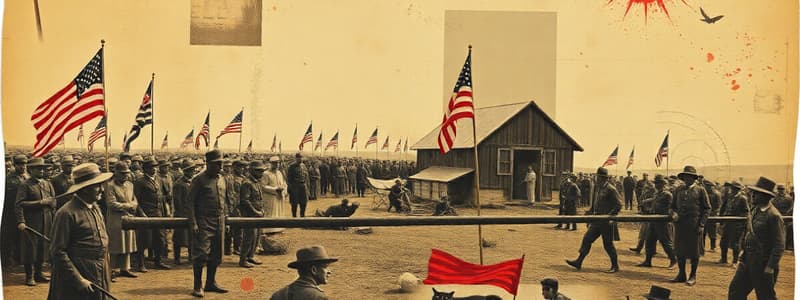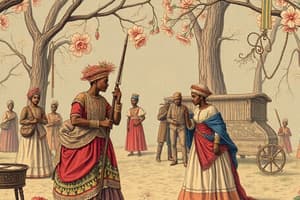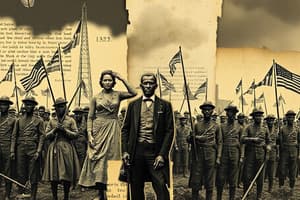Podcast
Questions and Answers
What was the significance of the Dred Scott decision in 1857?
What was the significance of the Dred Scott decision in 1857?
- It established legal rights for free African Americans.
- It declared the Missouri Compromise unconstitutional. (correct)
- It granted citizenship to all enslaved individuals.
- It allowed for the expansion of slavery into the northern states.
Which amendment abolished slavery in the United States?
Which amendment abolished slavery in the United States?
- The 13th Amendment (correct)
- The 10th Amendment
- The 15th Amendment
- The 14th Amendment
What was a direct consequence of the Emancipation Proclamation?
What was a direct consequence of the Emancipation Proclamation?
- It granted immediate citizenship to all African Americans.
- It freed enslaved people in the border states.
- It ended the Civil War immediately.
- It declared enslaved individuals in Confederate territories to be free. (correct)
What are some ongoing issues linked to the legacy of slavery in the United States?
What are some ongoing issues linked to the legacy of slavery in the United States?
How did the transatlantic slave trade affect African cultures and societies?
How did the transatlantic slave trade affect African cultures and societies?
What was the primary economic reliance of the Southern states prior to the Civil War?
What was the primary economic reliance of the Southern states prior to the Civil War?
Which of the following events was NOT a result of the debates around slavery?
Which of the following events was NOT a result of the debates around slavery?
How did slavery contribute to wealth disparity between the North and South?
How did slavery contribute to wealth disparity between the North and South?
What movement sought to completely end slavery before the Civil War?
What movement sought to completely end slavery before the Civil War?
Which of the following correctly describes sectionalism as a cause of the Civil War?
Which of the following correctly describes sectionalism as a cause of the Civil War?
Which prominent abolitionist is known for engaging in public discourse and publishing anti-slavery literature?
Which prominent abolitionist is known for engaging in public discourse and publishing anti-slavery literature?
What was one of the major issues regarding the expansion of slavery into newly acquired territories?
What was one of the major issues regarding the expansion of slavery into newly acquired territories?
Which key legislation attempted to address the slavery issue but failed to prevent further conflict?
Which key legislation attempted to address the slavery issue but failed to prevent further conflict?
Flashcards are hidden until you start studying
Study Notes
Introduction to the American Civil War and Slavery
- The American Civil War (1861-1865) was a major conflict between the Union (North) and the Confederacy (South).
- The central cause was the issue of slavery, deeply ingrained in the Southern economy and social structure.
- The South's reliance on enslaved labor for agriculture (primarily cotton) fostered a strong pro-slavery stance.
- The North, with its growing industrial economy and abolitionist movement, opposed slavery.
Causes of the American Civil War: Slavery as a Key Driver
- Sectionalism, the division between North and South, was a significant factor. Economic, social, and political differences amplified tensions.
- Slavery was fundamental to the Southern agrarian economy and social order, permeating all aspects of life.
- The debate over extending slavery to newly acquired territories became a key point of contention, causing political conflicts and disputes over congressional power balance.
- Attempts to resolve the slavery issue, such as the Missouri Compromise (1820), Compromise of 1850, and Kansas-Nebraska Act (1854), ultimately failed to prevent escalating conflict.
Slavery and the Southern Economy
- Southern agriculture, particularly cotton farming, heavily depended on enslaved labor. Profits from this system significantly fueled the Southern economy.
- The plantation system, built on forced labor, shaped the South's social and political structure.
- Enslaved labor provided a low-cost workforce, generating immense wealth for the Southern elite and contributing to the vast wealth disparity between North and South.
The Abolitionist Movement and its Impact
- The abolitionist movement, advocating for the immediate and complete freedom of enslaved people, played a crucial role in creating anti-slavery sentiment in the North.
- Abolitionists employed various methods – publishing anti-slavery literature, forming societies, and engaging in public debate – to challenge the morality and legality of slavery.
- Figures like Frederick Douglass, William Lloyd Garrison, and Harriet Beecher Stowe influenced public opinion against slavery through their writings and activism.
Key Events Leading to the Civil War
- The Dred Scott Supreme Court decision (1857) worsened tensions, denying enslaved people citizenship and declaring the Missouri Compromise unconstitutional.
- Abraham Lincoln's election (1860), a Republican opposed to slavery expansion, was a critical factor in triggering secession.
- Southern states seceded from the Union prior to the war, establishing the Confederate States of America.
Impact of the Civil War on Slavery
- The Civil War decisively ended slavery in the United States.
- Lincoln's Emancipation Proclamation (1863) declared enslaved people in Confederate territory free.
- The 13th Amendment (1865) abolished slavery nationwide.
Legacy of Slavery in the United States
- The legacy of slavery continues to impact American society today, with significant economic, social, and political disparities between formerly enslaved communities and others.
- Racial inequality, systemic racism, and ongoing economic disparities are directly linked to historical injustices of slavery.
Additional Context on Slavery
- The transatlantic slave trade, which forcibly brought millions of Africans to the Americas, had devastating consequences for African culture and societies.
- The justification of slavery was based on racial myths and stereotypes, a viewpoint challenged by historians and social activists.
- Slavery remains a crucial historical and social topic of study.
Studying That Suits You
Use AI to generate personalized quizzes and flashcards to suit your learning preferences.
Description
This quiz covers the critical factors leading to the American Civil War, with a particular focus on slavery as a driving force. Explore the economic, social, and political tensions between the North and South that culminated in this pivotal conflict. Test your knowledge on the implications of slavery in American history.



